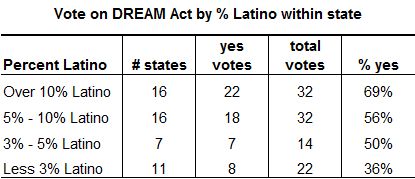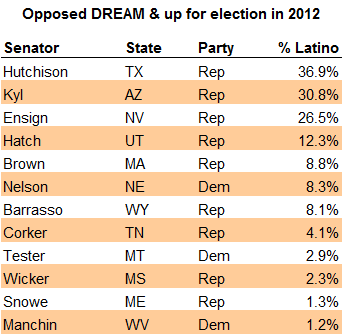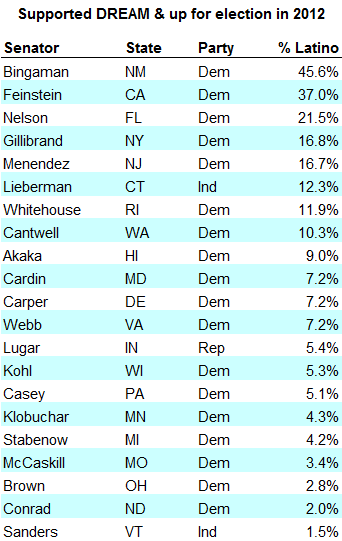Yesterday the U.S. Senate failed to invoke cloture on the DREAM Act (HR 5281), ending the chance for any legislative accomplishments on the issue of immigration. While much of the last two years was spent addressing the issues of health care reform, and the economy, to Latino voters a third issue loomed as being equally important for the President and Congress to address – immigration reform. In our final tracking poll released November 1, 2010 Latino voters told us that immigration was the second most important issue, just behind the economy. In our 2010 election eve poll 48% of Latino voters said jobs/economy was the top issue of concern, but immigration loomed as a major issue with 37% calling it the top issue to be addressed. And when asked specifically about the DREAM Act, the same poll found 75% of Latino voters said it was very or extremely important for the DREAM Act to be passed by Congress, with another 13% saying somewhat important — that’s 88% all told who thought it was important for Congress to pass DREAM.
Last week, Prof. Stephen Nuño posted analysis of the DREAM Act by party affiliation which found that 80% of Latino Republicans supported the DREAM Act, as did 90% of Latino Democrats. Among foreign born Latino voters 94% supported passage of DREAM, and among U.S. born Latinos 86% supported its passage. It was clear from more than two-dozen polls we conducted in 2010 that immigration reform was a top issue of concern for Latino voters, and yesterday those hopes and dreams for just a small start to comprehensive reform were shattered by the 45 Senators who did not support moving forward with the DREAM Act.
Among the 45 Senators who did not support moving ahead with the DREAM Act were 6 Democrats and 39 Republicans. While Republicans provided the lion’s share of opposition, with 3 Republicans voting yes, the bill could have achieved 61 votes had all Democrats stood together and voted yes. Overall, Senators from “Latino influence” states were far more likely to vote yes for DREAM, than those from states with very small Latino populations – however notable exceptions are the Senators from Texas and Arizona. Among the 16 states that have a Latino population share of 10% or higher, 69% of Senators voted yes. The 16 states where the Latino population was 5 – 10% of the state total, voted 56% in favor of DREAM. As the Latino population in a state decreased, so too did votes for DREAM, with only half voting yes in states where Latinos are 3 – 5% of the population, and just 36% voting yes in states where Latinos are less than 3%.

With such a strong relationship here between Latino constituents and support for the DREAM Act, a significant question is why did both Senators from Texas, and both Senators from Arizona oppose the DREAM Act? In 2010, Latino voters were hailed as an important voting bloc which swung at least three competitive U.S. Senate races to the Democrats. In 2012, twelve Senators who voted no on the DREAM Act are up for election, and seven are from states where Latinos make up at least 8% of the population, or more than enough to sway the outcome in a tight contest. Leading this pack of anti-DREAM incumbents up for election in 2012, when public approval of the Senate is likely to remain low, are Kay Bailey Hutchison from Texas (36.9% Latino) and Jon Kyl from Arizona (30.8% Latino). In the Washington Post, Edward Schumacher-Matos noted the day before the vote that Hutchison could be vulnerable in 2012 if she voted no. With strong challengers and voters weary of incumbents, both Hutchison and Kyl could be in significant trouble if they can’t crack 20% of the Latino vote in 2012.
Add to the list John Ensign of Nevada (26.5% Latino) where Latinos single-handedly turned away the anti-immigrant candidate in 2010, and Scott Brown who will almost certainly be in tight contest in left-leaning Massachusetts (8.8% Latino). Across the aisle, there may be little reason for Latinos in Nebraska (8.3% Latino) to continue supporting Ben Nelson who voted no on DREAM.


As the 2012 election cycle takes shape, and the issues are defined and debated, it is unlikely that votes on the DREAM Act will be forgotten by Latino voters, 88% of whom supported the bills passage. If any lesson was learned in 2010, it should be to not underestimate the Latino electorate, which is growing in size, and influence in each successive election.

